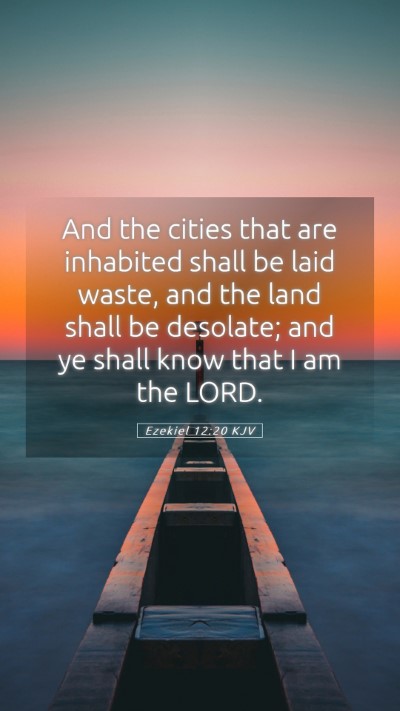Ezekiel 12:20 - Commentary and Understanding
Ezekiel 12:20 states: "And the cities that are inhabited shall be laid waste, and the land shall be desolate; and ye shall know that I am the Lord." This verse forms part of Ezekiel's prophecy concerning the impending judgment on Jerusalem and the nation of Israel. Below, we provide a comprehensive analysis, merging insights from notable public domain commentaries.
Overview of the Verse
This prophetic message emphasizes the desolation that will come upon the cities of Judah and the significant spiritual implication that follows. Ezekiel conveys the certainty of the Lord's judgment, meant to draw the people back to an understanding of God's sovereignty and holiness.
Interpretation and Insights
According to Matthew Henry, this verse highlights the consequence of the people's sin—a reminder to Israel that their disobedience leads to divine retribution. The destruction serves not only as punishment but also as a catalyst for spiritual awakening. Henry expounds that desolation often leads to a recognition of God’s authority, urging the people toward repentance.
Albert Barnes points out the phrase "ye shall know that I am the Lord" as a pivotal moment where the people would realize God’s ultimate control over their circumstances. Such recognition leads to the restoration of the covenant relationship they once had, fostering an understanding that God’s judgment is a precursor to His mercy.
Adam Clarke interprets the cities' desolation as a potent symbol of God’s discipline. He stresses that this message serves as both warning and encouragement to seek reconciliation with God. Clarke elaborates that amidst destruction, God's presence must be acknowledged, and this awareness is essential for healing and restoration post-judgment.
Theological Significance
In examining the theological implications, we see that this verse invites deeper Biblical exegesis, focusing on the relationship between sin, judgment, and redemption. Ezekiel's messages provide critical Bible study insights about God's righteousness and justice, reflecting on how believers should respond when faced with God's discipline.
Practical Applications
This verse encourages us to reflect upon our lives in light of God’s expectations. Here are some Bible study resources for further exploration:
- Application of Ezekiel's Prophecies: Recognizing areas in our lives needing repentance.
- Historical Context: Understanding the backdrop of the Babylonian exile reveals critical lessons for us today.
- Personal Reflection: How can we recognize God’s workings in our lives amid challenges?
Cross References
This verse relates to several other important scriptures that enhance our understanding:
- Jeremiah 25:9: Prophecy of the coming destruction of Jerusalem.
- Ezekiel 33:28: Further elaboration of the land becoming desolate.
- Isaiah 32:14: A prophecy concerning the desolation of cities.
Conclusion
In summary, Ezekiel 12:20 serves as a powerful testament to God’s authority over His people and their need for repentance. Through the lens of detailed Bible verse commentary, we gain insights into the seriousness of sin and the importance of recognizing God's sovereignty. This verse is not just historical; it invites us into a profound understanding of God's character and His expectations.
Whether involved in Bible study groups or pursuing online Bible study, let this verse inspire a deeper accountability to our faith and encourage us to seek God’s guidance actively.


